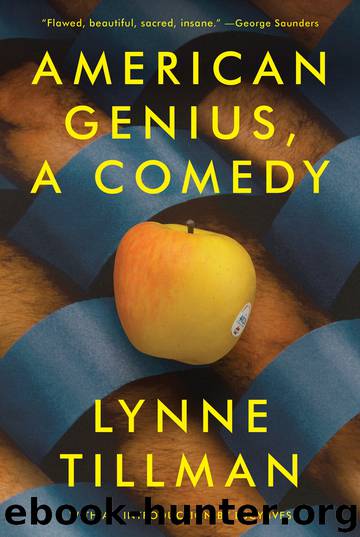American Genius by Lynne Tillman

Author:Lynne Tillman
Language: eng
Format: epub
ISBN: 9781593763176
Publisher: Soft Skull Press
Published: 2018-11-21T05:00:00+00:00
THE SHOPKEEPER’S DRESS IS WOOL cambray, coarse and brown, a simple design with no excess, no flounces or decoration, a studiously severe outfit like that which might have been worn by a Puritan prison guard, and she also wears a stiff bonnet tied under her chin with a gray grosgrain ribbon, whose serrated edges sink into her fleshy neck, reddening her olive skin at those points. In this town and the environs, the textile industry flourished from the beginning of the 19th century, when the region was home to many mills, as well as ball-bearing factories, and none of this is now evident except as historical lore on plaques. The town and state has many rivers and streams, great water power for running mills, and Eli Whitney may have passed through; his cotton gin is mentioned in the town’s brochures, though it wasn’t invented here. Rows of warping machines dwarfed child workers, whose fingers and hands must have bled from cuts, their soft skin hardened and scarred over time from the process of carting, spinning, and sorting the rough raw materials, cotton and wool, into threads, yarns, and finally fabrics, while the multitude of spindles revolving in spinning rooms whirred and cranked noisily during the ten- to twelve-hour workdays. In 1860, not far from here, in Lowell, Massachusetts, there were more cotton spindles than in all the eleven states that combined would eventually make up the Confederacy, so the North had an industrial advantage, though both white Northerners and Southerners mostly disdained skins darker than theirs. In America the Industrial Revolution proceeded with strength only after the Civil War ended, and the first textile factory workers were like indentured servants. Max Weber theorized it was slavery that brought about the end of the Roman Empire, as Rome’s troops were complemented by their slaves, who needed to be fed and housed when they advanced, so they weren’t productive labor, they didn’t fight, but instead slowed the Roman army and cost it dearly, and slavery might have similarly ruined the American economy as it industrialized, since slavery was part of an agrarian society. In the postcard tray I search for something I might send the Polish woman, who wouldn’t expect attention or remembrance from me, since she never thinks of me, and I sometimes believe she doesn’t know my name, but because of that I’d like to mail her a pleasant card, since I do think of her. Choosing it prolongs my stay in the shop, and while I ramble about, the kitchen helper has probably left the café, as the shopkeeper tugs at her uncomfortable dress, looking at me with suppressed impatience, and at last I settle on a postcard with a pastoral scene that might be appropriate to the taste of the Polish aesthetician. The shopkeeper smiles now, relieved, and soon she’ll ask me to return, which I will, but on a long-ago visit to a similar shop in the South near a similar town, where fate was summoned when
Download
This site does not store any files on its server. We only index and link to content provided by other sites. Please contact the content providers to delete copyright contents if any and email us, we'll remove relevant links or contents immediately.
In Control (The City Series) by Crystal Serowka(36199)
The Wolf Sea (The Oathsworn Series, Book 2) by Low Robert(35213)
We Ride Upon Sticks by Quan Barry(34493)
Crowbone (The Oathsworn Series, Book 5) by Low Robert(33589)
The Book of Dreams (Saxon Series) by Severin Tim(33350)
The Daughters of Foxcote Manor by Eve Chase(23583)
Trainspotting by Irvine Welsh(21607)
Call Me by Your Name by André Aciman(20466)
The Secret History by Donna Tartt(18998)
Shot Through The Heart (Supernature Book 1) by Edwin James(18900)
All the Missing Girls by Megan Miranda(15887)
The Girl from the Opera House by Nancy Carson(15761)
American King (New Camelot #3) by Sierra Simone(15756)
Pimp by Iceberg Slim(14464)
Sad Girls by Lang Leav(14383)
The Betrayed by Graham Heather(12800)
The Betrayed by David Hosp(12753)
4 3 2 1: A Novel by Paul Auster(12354)
Still Me by Jojo Moyes(11239)
